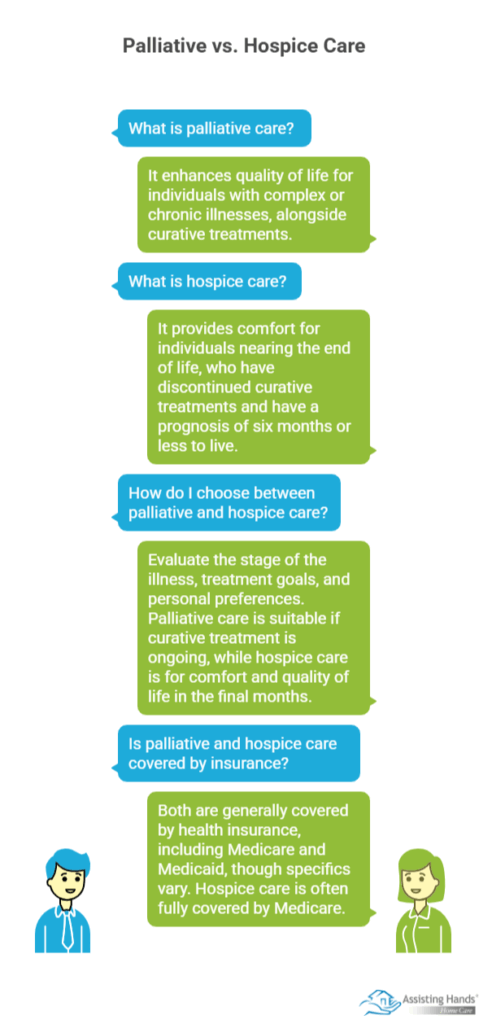
Table of Content
Navigating the intricate healthcare choices for a senior loved one living with a serious illness can feel overwhelming. Understanding the distinct differences between palliative and hospice care is key to making informed decisions that align with your loved one’s needs and wishes. Both provide significant support but cater to different stages and goals of care.
Palliative Care Defined
Palliative care focuses on enhancing quality of life for individuals living with complex or chronic illnesses. Unlike hospice care, palliative care can be provided alongside curative treatments. It addresses physical symptoms, emotional needs, and even spiritual concerns, ensuring seniors receive comprehensive support.
Palliative care is available at any stage of an illness and isn’t limited to terminal conditions. For example, individuals with chronic diseases like heart failure, cancer, or Parkinson’s disease often benefit from palliative care interventions. Medical professionals such as physicians, nurses, and social workers collaborate to create a patient-centered care plan.
Key features of palliative care include pain management, symptom relief, and emotional support for both seniors and their families. It allows seniors to maintain active and fulfilling lives while receiving treatment to manage their conditions.
Though you may be researching multiple agencies that provide senior home care, Jasper, TN, Assisting Hands Home Care has much to offer your family and your elderly loved one. We are leaders in the senior home care industry, offering hourly and around-the-clock assistance from reliable, experienced caregivers. Trust Assisting Hands Home Care to help your loved one enjoy a happier and healthier life in the golden years.

Hospice Care Explained
On the other hand, hospice care specifically focuses on providing comfort for individuals nearing the end of life. It’s designed for those who have decided to discontinue curative treatments and have a prognosis of six months or less to live, as certified by a doctor.
The primary goal of hospice care is ensuring seniors spend their remaining time in peace and with dignity, surrounded by their loved ones. Hospice care typically occurs in the home, but it can also take place in hospice facilities, nursing homes, or hospitals.
Core services provided by hospice care include pain and symptom management, emotional and spiritual support, and assistance with daily activities. Furthermore, hospice care extends bereavement support to grieving families, offering counseling and resources after the senior’s passing.
Choosing between Palliative and Hospice Care
When deciding between palliative and hospice care, it’s essential to evaluate the stage of the illness, your loved one’s treatment goals, and personal preferences. If your loved one is still pursuing curative treatment and requires help managing symptoms, palliative care might be the right choice.
However, if your loved one and your family have chosen to focus solely on comfort and quality of life during the final months, hospice care offers the specialized support you need. It’s crucial to have an open and honest conversation with your loved one’s healthcare team to weigh all options carefully.
Seniors can face a variety of age-related challenges. Though some families choose to take on the caregiving duties, there may come a time when they need a trusted home care provider. Families sometimes need respite from their duties so they can focus on their other responsibilities, and some seniors need around-the-clock assistance that their families are not able to provide. Assisting Hands Home Care is here to help.
Coverage and Accessibility
One of the common concerns surrounding both palliative and hospice care is affordability. Both types of care are generally covered by health insurance, including Medicare and Medicaid, though specifics vary. Hospice care is often fully covered by Medicare under the Hospice Benefit, which includes medical equipment, medications, and supportive services.
Palliative care, although less commonly covered in full, may be included as part of regular medical insurance benefits. It’s important for families to cross-check their insurance plans and consult with providers to understand the financial aspects of care.
Emotional and Family Considerations
Both palliative and hospice care recognize the emotional toll illnesses take, not just on seniors but also on their families. Through counseling services, caregiver support, and bereavement programs, these care options address the mental health needs of everyone involved.
Choosing between the two care types shouldn’t just be a medical decision. It must also account for your loved one’s personal values, hopes, and emotional wellbeing. Open communication among family members and medical professionals can facilitate a collective decision, ensuring your loved one feels supported every step of the way.
For some families, caring for a senior loved one can be overwhelming at times. Luckily, they can rely on professional respite care. Jasper, Tennessee, Assisting Hands Home Care is a trusted name in respite and hourly care. Our caregivers are available around the clock to assist seniors with bathing, transportation, medication reminders, exercise, and much more, allowing families the time they need to focus on other important responsibilities or just take a break. If you need professional care for your loved one, reach out to one of our Care Specialists today.
